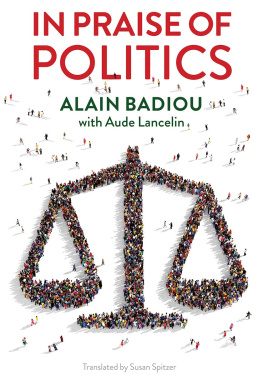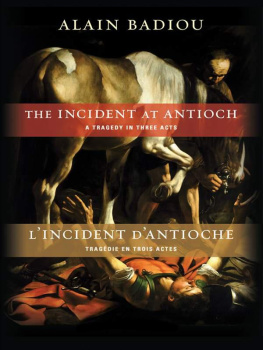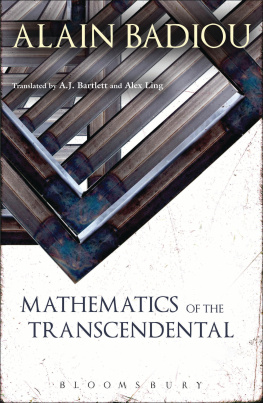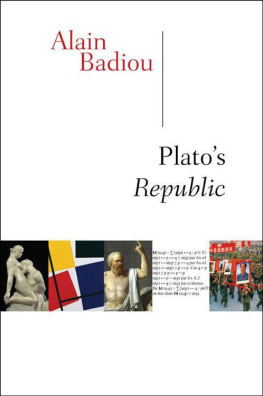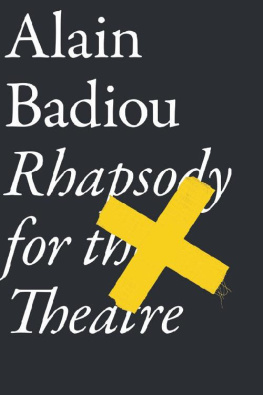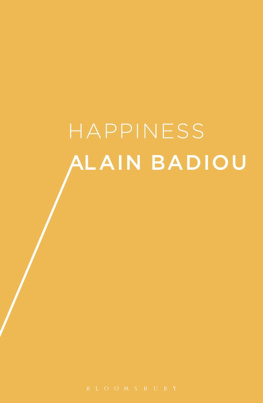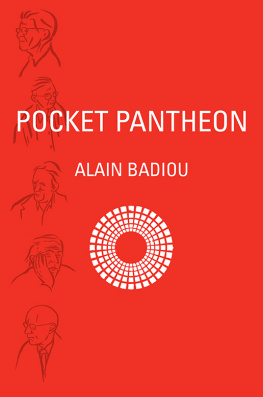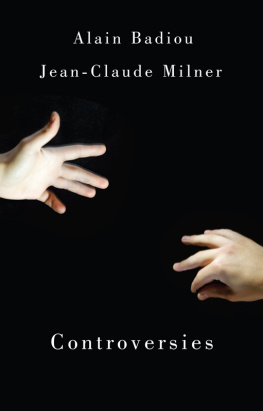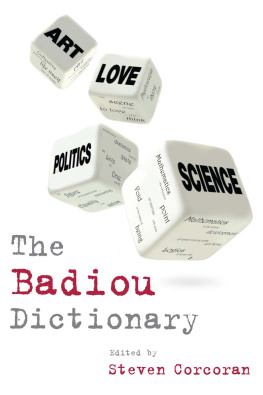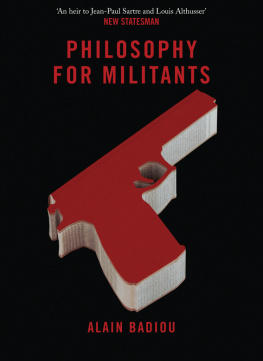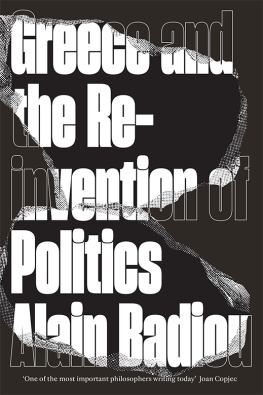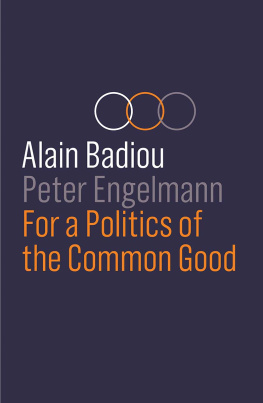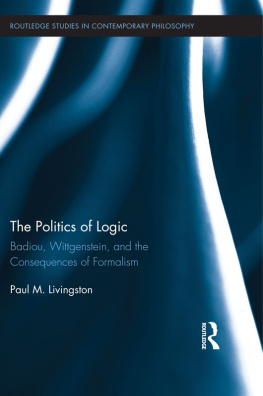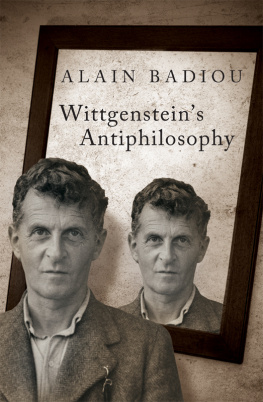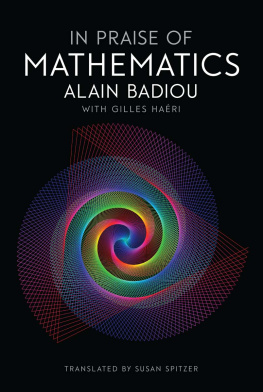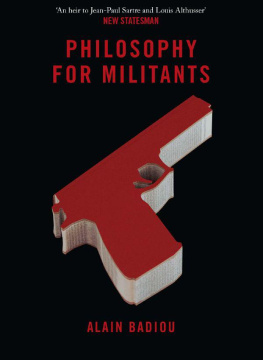CONTENTS
Guide
Pages

In Praise of Politics
Alain Badiou
with Aude Lancelin
Translated by Susan Spitzer
Polity
First published in French as loge de la politique Flammarion, Paris, 2017
This English edition Polity Press, 2019
Polity Press
65 Bridge Street
Cambridge CB2 1UR, UK
Polity Press
101 Station Landing
Suite 300
Medford, MA 02155, USA
All rights reserved. Except for the quotation of short passages for the purpose of criticism and review, no part of this publication may be reproduced, stored in a retrieval system or transmitted, in any form or by any means, electronic, mechanical, photocopying, recording or otherwise, without the prior permission of the publisher.
ISBN-13: 978-1-5095-3370-1
A catalogue record for this book is available from the British Library.
Library of Congress Cataloging-in-Publication Data
Names: Badiou, Alain, interviewee. | Lancelin, Aude, interviewer.
Title: In praise of politics / Alain Badiou, Aude Lancelin. Other titles: loge de la politique. English
Description: English edition. | Medford, Massachusetts : Polity Press, [2019] | Includes bibliographical references and index.
Identifiers: LCCN 2018040026 (print) | LCCN 2018054194 (ebook) | ISBN 9781509533701 (Epub) | ISBN 9781509533671 | ISBN 9781509533671(Hardback) | ISBN 9781509533688(Paperback)
Subjects: LCSH: Political science--Philosophy. | Badiou, Alain--Interviews. Classification: LCC JA71 (ebook) | LCC JA71 .B26413 2019 (print) | DDC 320.01--dc23
LC record available at https://lccn.loc.gov/2018040026
The publisher has used its best endeavours to ensure that the URLs for external websites referred to in this book are correct and active at the time of going to press. However, the publisher has no responsibility for the websites and can make no guarantee that a site will remain live or that the content is or will remain appropriate.
Every effort has been made to trace all copyright holders, but if any have been overlooked the publisher will be pleased to include any necessary credits in any subsequent reprint or edition.
For further information on Polity, visit our website: politybooks.com
What Is Politics?
What a strange idea, well be told, to be coming out in praise of politics in the year of a presidential election [2017], when that election was distinguished above all by its exposure of a broken-down landscape ever more shockingly abandoned to the free play of the forces of capital. One really has to wonder what might still be of interest to a philosopher in such a case. How do you respond to people, young people in particular, who cant imagine politics as anything other than an arena for cynicism and opportunism?
That kind of feeling can only be understood by asking, first, what exactly is meant by the word politics. Its a long story. From the beginning of the story, several millennia ago, the idea was that politics was power, the issue of the assumption and exercise of state power vis--vis established communities, communities whose members were known and identified. The first definition therefore considers that the central indeed, sole issue of politics is state power. Its a simple definition but one that nevertheless runs through all of history: it was still Lenins definition, for example, and is still ours as well, in a rudimentary form, when politics is reduced to the electoral choice of a president.
This definition may give rise to a very cynical conception of politics as consisting of competition, rivalry, and ruthlessness, with the aim of seizing power, assuming it, and wielding it as one sees fit. There are theorists of politics so conceived, foremost among them being undoubtedly Machiavelli. Machiavelli described in an extremely sophisticated, positivistic, one might even say technical, way the various methods of struggle for the seizure and assumption of power as well as the qualifications needed for engaging in that kind of fight. He occupies a unique position as a theorist of politics, if it is conceived in these terms. Admittedly, we see little else today than that fight, with all that entails in terms of baseness, corruption, deceit, violence, and so on. But then, the author of The Prince had already showed that these elements were strongly associated with the question of politics and its exercise.
In contrast to this vision there developed, over a very turbulent, complex history, and in close connection with philosophy, another conception of politics: one that holds that politics has a constitutive relationship with justice. Throughout their historical existence (admittedly not a very long one, about twenty centuries), philosophers have endeavored to give a precise definition of justice. But whatever the definition, if the idea of justice is involved in the definition of politics then it can no longer be defined simply as the struggle for power. The central question becomes: What is a just power? And the debate over politics is less about the exercise of power than about the norms to which power is subject, its relationship to the community, and its objectives.
Between politics defined as power focused entirely on the power of the state and politics defined as justice focused on questions like What of the community, the relationship among its members, its aspirations? What of categories like equality and freedom? there is both a connection and a conflict. There is a connection because, ultimately, justice cannot remain a purely abstract idea with no bearing on the reality of the state. So, the question of justice is also, necessarily, the question of a just power. And, on the other hand, there is a conflict, because power divorced from the concept of justice is subject to the degradations that have occurred throughout history and of which the 2017 presidential election in France is but one episode. And hardly a brilliant one, considering all the corruption and sinister developments it involved.
The conflict between justice and power itself has a long history. Plato had already attempted to establish the standards for a state governed by the idea of the Good and had shown, through a very sophisticated analysis of the different types of government oligarchy, democracy, timocracy, and anarchy that it was no easy task. Relatively late in the day, no doubt around the eighteenth century, with Rousseau in particular, and later through the efforts of such nineteenth-century revolutionary thinkers as Marx and Engels, of course, but also Proudhon, Fourier, and Feuerbach, not to mention Auguste Comte and Blanqui, the hypothesis that justice may actually be incompatible with power emerged. Consequently, the perspective on politics changed: state power might only be a transitory instrument, one that was necessary for a whole period of history but would be replaced by the establishment of a justice that would be, as it were, in the hands of humanity itself. This might be the dialectical movement that overcomes the opposition between justice and power.
Your philosophical system defines politics as a truth procedure, along with love, art, and science. In what sense do you mean this? Certainly, theres a general belief that nothing could be further from politics than a concern for truth
Sure, and as a matter of fact Machiavelli defined politics broadly as a sovereign art of lying. An ability to lie has always been considered a necessity for politicians in general, if only to win power by making promises that wont be kept. When I define politics as a truth procedure, I obviously mean politics in the second sense weve just considered, namely when it is organically linked to the category of justice.

